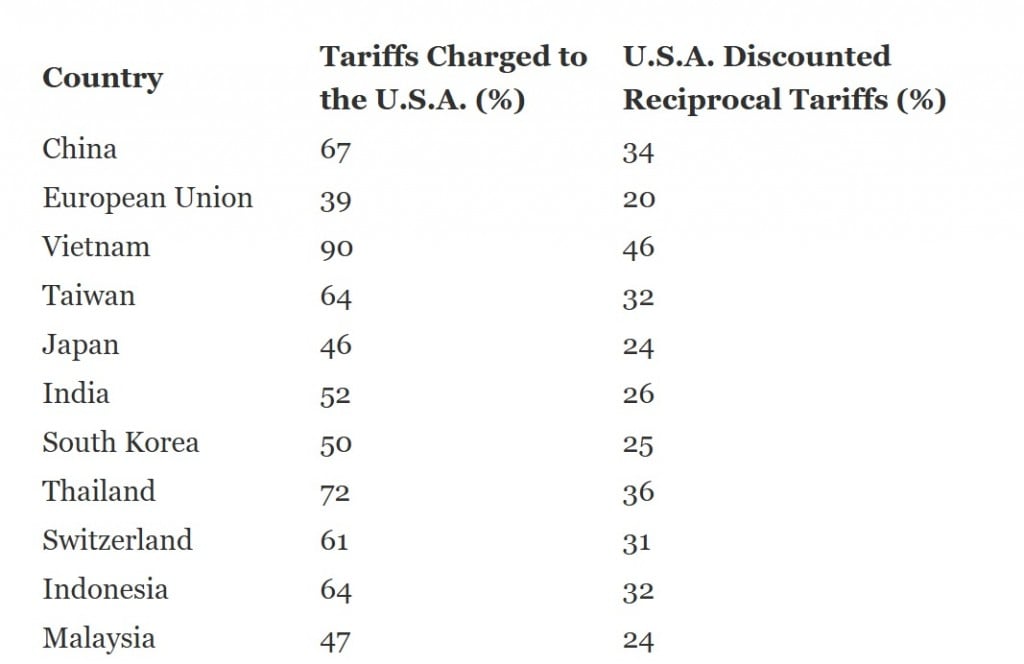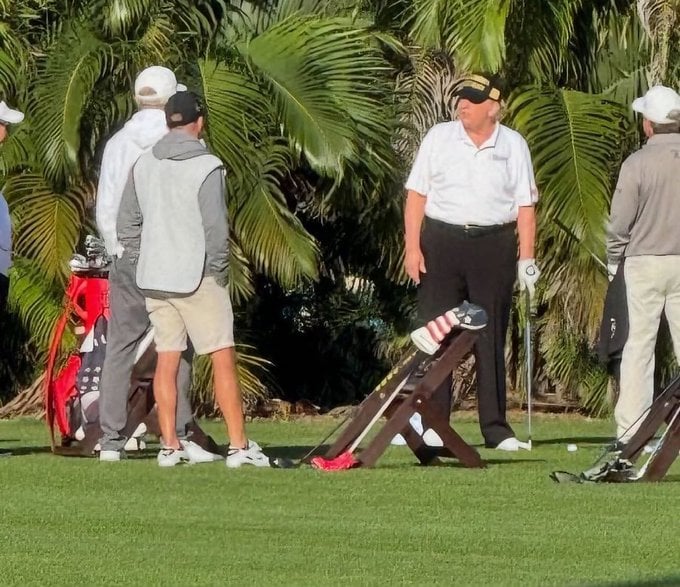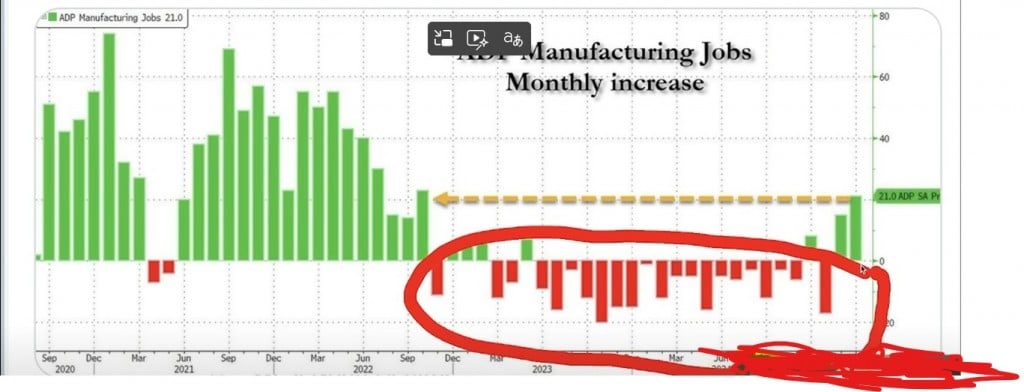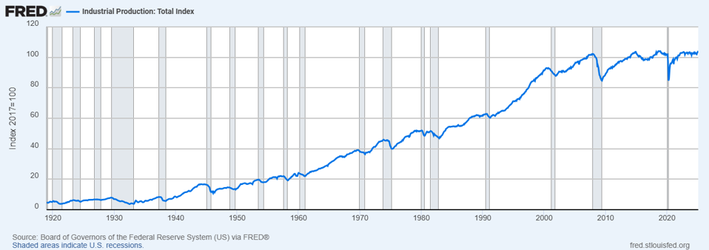Trump and his vision of bringing back manufacturing to the U.S.
.
Trump's vision of manufacturing is in the days of billowing smokestacks. assembly lines, and conveyor belts where all kinds of workers are doing their bit and piece to assemble products that come rolling off the assembling lines and that those workers will be paid a great wage..
In today’s world, manufacturing is highly automated with robots and other high-tech equipment and procedures. However, there is a growing demand for service related businesses.
There is now a shift from manufacturing to services reflecting a broader change in global economic trends. As economies mature, they often experience a growing reliance on services due to technological advancements, globalization, and shifting consumer preferences. Here's why services are taking the lead:
1. Automation: Manufacturing processes have become increasingly automated, reducing the need for human labor. This has freed up workers to pursue roles in service industries.
2. Economic Development: As societies become wealthier, consumer demand often tilts toward services such as healthcare, education, entertainment, and hospitality, rather than physical goods.
3. Globalization: Manufacturing jobs often move to countries with lower labor costs, while services—especially those requiring proximity, personalization, or specialized knowledge—remain localized.
4. Technological Innovation: The rise of digital services, like software development, cloud computing, and online platforms, has fueled the growth of service-based economies.
This shift brings new opportunities but also challenges, such as reskilling the workforce and maintaining fair wages.
One of the visions Trump has is to employ more people in car manufacturing. However, automation is a game-changer in the world of car manufacturing! It's all about streamlining production, improving precision, and enhancing efficiency. Here are some keyways automation is used:
• Assembly Line Robots: Robots handle tasks like welding, painting, and assembling parts. They work quickly and with consistent precision, reducing human error.
• Quality Control: Advanced sensors and cameras powered by AI inspect components and finished vehicles for defects, ensuring high quality in every car produced.
• Supply Chain Management: Automated systems track inventory and manage supply chains to ensure that materials are available exactly when needed.
• Testing and Safety: Automated testing systems simulate real-world conditions to test vehicle durability, performance, and safety features.
• Custom Manufacturing: Automation allows for the efficient production of customized vehicles, as robots can quickly adapt to different designs or specifications.
This combination of robotics, AI, and automation allows manufacturers to produce vehicles faster, safer, and often more cost-effectively, while maintaining high-quality standards
Here is how automation is used in the manufacturer of appliances.
When it comes to appliances, automation has made significant strides! Here's how automated manufacturing benefits appliance production:
- **Precision Assembly**: Robots and machines assemble intricate components of appliances, such as washing machines, refrigerators, and ovens, ensuring accuracy and consistency.
- **Testing and Quality Assurance**: Automated systems perform rigorous testing on appliances, checking for defects, energy efficiency, and functionality before they reach consumers.
- **Customization**: Automation allows manufacturers to offer custom features, like different sizes, colors, or configurations, without slowing down the production line.
- **Efficiency in Production**: Automated systems help streamline processes like metal stamping, plastic molding, and wiring, speeding up production while reducing waste.
- **Sustainability**: Automation can optimize material usage and energy consumption, promoting eco-friendly manufacturing practices.
Automation not only makes appliances more affordable and reliable but also helps companies meet the ever-evolving demands of consumers.
Let’s see where Trump’s vision of increasing manufacturing jobs takes us.Just my view, another side to the coin. The argument suggests that Trump’s vision of manufacturing is outdated, focusing on traditional assembly line work rather than the reality of modern automation. However, this perspective oversimplifies the issue and underestimates both the role of human workers in today’s factories and the broader economic impact of revitalizing manufacturing.
While it is true that automation has changed the nature of manufacturing, it has not eliminated the need for human workers. Many manufacturing jobs today require skilled labor to program, maintain, and oversee automated systems. In fact, the push to bring manufacturing back to the U.S. is not about returning to smokestacks and conveyor belts but about securing domestic supply chains, reducing reliance on foreign production, and creating well-paying jobs in advanced manufacturing. Industries like semiconductor production, aerospace, and high-tech automotive manufacturing still require a substantial workforce.
Moreover, while the service sector is growing, not all service jobs provide the same economic stability as manufacturing jobs. Many service industry positions, especially in hospitality and retail, offer lower wages and fewer benefits than traditional manufacturing roles. A strong manufacturing base contributes to economic security by creating high-paying jobs, supporting related industries, and driving innovation.
Additionally, globalization has shown its risks, especially in recent years with supply chain disruptions and geopolitical tensions. Depending too heavily on foreign manufacturing has led to shortages in critical goods like semiconductors, pharmaceuticals, and essential consumer products. Trump’s vision of bringing manufacturing back to the U.S. is not about ignoring automation but rather ensuring that America remains competitive in high-tech industries while providing stable employment for workers.
While automation is transforming industries, manufacturing is far from obsolete. Instead of viewing Trump's vision as outdated, it should be seen as a necessary shift to balance technological advancements with economic security. Investing in manufacturing means investing in workforce training, infrastructure, and national resilience. The question should not be whether manufacturing jobs will exist but how the U.S. can adapt its workforce to remain a leader in global production.Automation doesn't require as many assembly line workers. Granted, it will require skilled programmers and those that control the automation, but the beauty of automation is it doesn't require as many manual labor workers on assembly lines.
If you were to visit a car manufacturing plant today, you would see many robots and conveyor belts taking the place of humans and very few operators controlling those automated machines. They would be more efficient, willing to work 24 hours per day and not require time off, vacations, or bathroom breaks.
On the other hand, there is more of demand today for high tech service related industries. Here are some examples required in a high tech field.
**IT Support Specialist**: Troubleshooting hardware and software issues for individuals or organizations.
- **Network Administrator**: Managing and maintaining computer networks to ensure smooth connectivity.
- **Technical Writer**: Creating user manuals, guides, and documentation for tech products.
- **Software Trainer**: Teaching users how to operate software or tools effectively.
- **Cybersecurity Analyst**: Protecting systems and networks from cyber threats.
- **Help Desk Technician**: Answering customer queries and resolving technical problems remotely or on-site.
- **Cloud Computing Specialist**: Assisting businesses in transitioning to and managing cloud-based solutions.
- **Web Administrator**: Maintaining websites and ensuring their functionality and security.
- **Data Analyst**: Interpreting and analyzing data to provide insights and solutions.
- **IT Project Manager**: Coordinating technology-related projects and ensuring they are completed successfully.
I think Trump is in for a big surprise. Manufacturing process today are not what they were 10 years ago and with AI they are constantly improving..I think Trump is in for a big surprise. Manufacturing process today are not what they were 10 years ago and with AI they are constantly improving..
Tim Walz being interviewed yesterday..
“It's like Trump is stuck in the '80s. His music, his clothing, his thinking.."
"Your points are solid and very much common sense. Great current issue. Thanks for posting this thread. I can see you put time and research in, I hope to see some address your well laid out OP.
I completely agree with you that Trump might be in for a big surprise when it comes to the realities of modern manufacturing. The industry has changed dramatically in the past decade, with automation, artificial intelligence, and advanced robotics transforming the landscape. AI is improving efficiency, reducing labor costs, and pushing manufacturing into realms we couldn’t have imagined 10 years ago. Factories today are far more automated, and many of the low-skill jobs that were once the backbone of American manufacturing have been replaced by machines.
However, there is another side to consider. While automation and AI are undoubtedly revolutionizing manufacturing, they also present a challenge in terms of the types of jobs that will be created. The promise of bringing back manufacturing jobs to the U.S. might not result in the same kinds of job opportunities that existed in the past. Many of the new positions in highly automated factories will require advanced skills and technical training, which could limit the pool of workers qualified for those roles. The reality is that many of the manufacturing jobs Trump envisions may not look like the ones from the mid-20th century, and the challenge will be to train and equip the workforce with the skills needed to thrive in this new, high-tech environment.
This task will certainly be difficult, and common sense tells me it can't be accomplished overnight. The workforce would need time to adjust to these shifts, and it would require significant investments in education, retraining, and infrastructure. Transitioning from traditional manufacturing jobs to those that focus on automation and AI is a complex process. It won’t happen quickly, and the path to creating a robust, modern manufacturing sector will take years of planning and effort.
But what of the great benefits if Trump can get the ball rolling? If the right policies are put in place to address these challenges, the rewards could be significant. Revitalizing manufacturing could create a more self-sufficient economy, reduce reliance on foreign production, and provide high-paying, skilled jobs that contribute to long-term economic stability. It could also lead to a stronger, more resilient supply chain that is better equipped to withstand global disruptions. If successful, this could set the stage for an innovation-driven manufacturing sector that could position the U.S. as a leader in emerging technologies, benefiting not just workers but the economy as a whole.Corporations are all about bottom line profits. The off-shore labor costs are much cheaper than our current workforce is willing to work for. Trump is letting go of thousands of employed people who are now going to be unemployed in the very near future.
Right now cars and appliances have parts that are made in other countries via established supply chains. it's hard to say a car is 100% made in America.
I have a feeling, he thinks he can take the federal money that was being paid to those he laid off and incentives corporations to increase the salaries of those who are employed.
However, I don't think it will be in the manufacturing sector where he has now focused his reciprocal tariffs.The argument that Trump’s policies will lead to layoffs and disruptions in the short term is valid. However, the long-term strategy, particularly around reshoring and tariff negotiations, aims to reduce dependence on offshore labor by making the U.S. a more attractive place to do business. Whether this will translate into the higher wages and job stability promised depends largely on how effectively the administration can tackle the deeper structural issues facing American manufacturing, including automation, worker education, and competition from low-cost countries.
Ultimately, these policies are not without risk. However, they reflect a broader desire to prioritize American workers and rebuild a manufacturing base that can thrive in a competitive global economy. Whether or not this vision succeeds depends on how well the transition is managed and whether there are sufficient investments in the American workforce.
If it does work out, though, the potential benefits could be truly transformative. A revitalized manufacturing sector could create a wave of high-quality, well-paying jobs for American workers, reduce reliance on foreign countries for essential goods, and help balance the U.S. trade deficit. With careful management, these policies could lead to a more sustainable and resilient economy, where American businesses are competitive on the global stage and workers can once again find stable, fulfilling careers in the manufacturing sector. This shift would not only benefit the workforce but also empower communities across the nation, fostering economic growth and national pride. If the vision succeeds, the U.S. could experience a manufacturing renaissance that strengthens its economy and secures its position as a global leader in innovation and production.Why are we acting like this is some kind of bold new idea? How did Smoot-Hawley work? Spoiler alert, it didn't. Why are we repeating history?
I expressed my view, I am not acting in any respect. I see no correlation between Trump's tariff strategy and Smoot-Hawley's tariffs. Trump's approach is a targeted effort to address specific trade imbalances, while Smoot-Hawley was a broad, isolationist policy that triggered a global trade collapse. The goals and outcomes of both are fundamentally different, and it's important to recognize that context and strategy matter when comparing these two historical moments.
Exactly... when one takes the time to research... rather than listen to the lies put out by a Media that has no interest in telling the truth, merely shaping people's fears and opinions, the tactic Trump is employing makes sense.
All he is forcing countries to do is play fair... you tariff our goods, we will tariff yours... you do away with those tariffs, we do away with ours.
Too simple?
Reciprocal tariffs are calculated as the tariff rate necessary to balance bilateral trade deficits between the U.S. and each of our trading partners.
Better?
Even with the proposed tariffs, these countries are still getting the better of the deal.
As for the companies reliant on cheap labor... boo hoo... time we put that money back into American's pockets via paychecks rather than continuing to destroy our Middle Class.Absolutely, I couldn’t agree more. When people take the time to dig beyond the headlines and emotional soundbites pushed by the media, they start to see that Trump’s trade strategies—especially reciprocal tariffs—are grounded in basic fairness. The media often paints them as reckless or overly simplistic, but in reality, he's using leverage to demand equal treatment. If other countries place high tariffs on American goods, why shouldn’t we respond in kind until there’s a level playing field? That’s not being combative—that’s protecting American workers, farmers, and manufacturers. It’s shocking how many people don’t realize that we’ve been absorbing unfair trade practices for decades, allowing foreign markets to profit while hollowing out our own industries. Trump’s approach is a bold stand against that imbalance. It may seem simple, but sometimes the most effective solutions are. It is shocking how the Left's hair is on fire. Trump is doing exactly what he ran on for two years, and we who voted for him expected him to keep his promises.
This and Ken's post miss all of the details, all the complexities and all of the nuances of trade with individual nations in very different parts of the world with very different economies. His tariffs could best be described as ham-handed... Mike provided a very in-depth article from the Tax Foundation that is probably one of the best analyzes I've seen
I just lost 25K in two days since Trump started this nonsense. I'm just one of millions of investors who have been affected by his vision. I saw a news clip where he is being interviewed on Air Force 1. They asked him how long it would take for his mild disruption and pain to recover. He said, "Oh, about one and half years. We cant' play this game for that long. Maybe he and his billionaire compadres can. But the average person is going to go down the tubes. This is what he said on NBC after two days of his "liberation day."
“THE OPERATION IS OVER! THE PATIENT LIVED, AND IS HEALING,” he posted on a day when the Dow Jones Industrial Average lost more than 1,600 points. “THE PROGNOSIS IS THAT THE PATIENT WILL BE FAR STRONGER, BIGGER, BETTER, AND MORE RESILIENT THAN EVER BEFORE.”Here is what is wrong with our country. After watching the Dow drop on CNN, I switched to Fox News to see what they were saying about Trump and his tariffs. They were showing a piece about how the shrimp industry is optimistic about Trump's tariffs.
In the lower right corner, it showed the Dow dropping precipitously and not a word was spoken about it. And they have a viewership that is much larger than the MSM. Look here, not there played a large factor in how Trump got re-elected.I'm surprised that they had the ticker up today... They didn't yesterday LOL... You know, "see no evil". They treat their viewers like idiots
The idea that you don’t "lose" until you sell is based on the fact that market fluctuations are temporary unless you lock in the loss by selling. If history is any guide, markets tend to recover, and investors who stay the course often see their portfolios rebound.
In fact, when investment houses buy on a dip, they often make great profits because they’re purchasing undervalued assets that will likely appreciate over time. This is the same reason why panic selling is usually a bad strategy—big investors are waiting to scoop up those shares at a discount. If you have a 401(k), there’s a good chance that when the market recovers, it could be worth even more than it was before the drop. Short-term volatility can be unsettling, but long-term growth is what truly matters in investing.According to Trump's statement, it will take one to two years to recover from this "pain and slight disruption.". Where is the bottom of the dip in the markets?
Mike---The Dow's 5.5% drop, while substantial, does not meet the 10% threshold for a correction. Therefore, while the Nasdaq has corrected, the Dow has not yet reached correction status. However, this is more likely all about the tariffs --- Not kidding myself.
The market could begin to rebound if the factors causing the downturn—such as concerns over tariffs or economic uncertainty—begin to ease. If there’s progress in trade negotiations or a sudden shift in investor sentiment, it could help reverse the market’s direction.
Will it take a year? Oh, if only I knew... I believe we've reached a point where predicting the market is extremely difficult. Everything seems to be turned upside down, with no clear pattern to follow, making it hard to say what the market will do or what it has done in similar situations before. I feel Trump will be negotiating throughout the weekend and, hopefully, we'll hear positive news about fair negotiations and what he may consider favorable deals. If that happens, it could trigger a buying frenzy in the coming weeks or months. If he achieves some wins, we could see a swift market rebound. Some could get very rich on all of this- if you know what I mean."The Nasdaq closed in a bear market for the first time since 2022, down more than 20% from its record high in December.
The Dow closed in correction, down more than 10% from its record high in December. It is the first time the Dow has closed in correction since March 7, 2022, according to Sam Stovall, chief investment strategist at CFRA Research. The Dow posted its biggest back-to-back losses since March 2020, during the onset of the Covid-19 pandemic."
Worse yet??
Nasdaq 100 Is Now in Bear Market ..
THANKS TRUMP. THANKS MAGA
https://www.bloomberg.com/news/articles … ve-updatesGood to hear it was corrected- The fastest recovery after a market correction occurred in 2020, following the sharp decline triggered by the COVID-19 pandemic. The market entered a correction in February 2020 as global lockdowns, uncertainty, and widespread economic shutdowns led to a rapid sell-off. The S&P 500 dropped over 30% from its peak in just a few weeks.
However, the recovery was incredibly swift. By August 2020, the market had fully rebounded and even surpassed its previous highs, marking one of the quickest recoveries in market history.
After the March 2022 correction, it took about 6 months for the market to regain its footing. The Dow and other indices began stabilizing in Q2 2022 and by August. However, a full recovery wasn’t seen until late 2022, despite ongoing volatility due to inflation concerns.
Hopefully, in the next few weeks, we will see a rebound. With a buying frenzy. It would not be typical, but what is typical anymore?Your misunderstanding "correction"...
It's not good. It's not a recovery.
a stock market "correction" is a significant decline in stock prices, typically defined as a drop of 10% or more from a recent peak, but less than 20% (which would be considered a bear market).
Even worse news? We've entered a bear market...
"I feel Trump will be negotiating throughout the weekend
Oh my.. is Fox not covering him? Sort of like they took the stock ticker from the bottom of the screen the other day??
Trump's golfing while the stock market crashes and soldiers' coffins arrive at Dover. The Saudis are hosting a golf tournament at his club...shows his true priorities, He doesn’t care about the working class or fallen heroes. Despicable.
Now imagine what Fox News etc would say if Biden was putting Saudi money in his pocket after he crashed the stock market....
I truly am pleased Trump has the energy he exhibits. IT is clear his weekends are filled with activities, and yes, golf. Do you play? Golf requires a mix of physical, technical, mental, and strategic skills. Physically, it demands hand-eye coordination, balance, flexibility, strength, and endurance. Technically, golfers must master the swing, short game (putting, chipping, pitching), and club selection. Mentally, golf requires focus, patience, confidence, and the ability to visualize shots. Strategically, players need course knowledge, shot selection, and the ability to adapt to conditions. Ultimately, golf is a game of consistency, decision-making, and precision.
Now Joe--- hard to even imagine him getting from a to b without directions and some help.
Can you imagine the uproar if President Biden skipped a dignified transfer of 4 dead U.S. soldiers to play golf instead, while at the same time, millions of 401Ks were being wiped out by his tariffs?
MAGA would DEMAND impeachment.
But for trump? Crickets. It's the height of hypocrisy isn't it?Do I really need to share the numerous statements from Gold Star families who spoke out about Joe Biden's demeanor and the lack of respect they felt when he did eventually show up? Hypocrisy is when no one addresses the scandal of how Biden's declining cognitive abilities were hidden from the public.
So you're perfectly okay that Trump golfed rather than attend the dignified transfer?
Is this what you are talking about?
Some Gold Star families had expressed frustration with President Joe Biden's demeanor during interactions following the tragic events of the Afghanistan withdrawal in 2021.
For instance, during a dignified transfer ceremony, some families felt disrespected when Biden appeared to check his watch multiple times.
Additionally, some families have voiced concerns about the administration's handling of the withdrawal and the lack of accountability for the events that led to the loss of their loved ones.Yes, this is what I referred to.
https://www.youtube.com/watch?v=N0W0i1JnhN0
https://www.youtube.com/watch?v=s887Yi1GpiA
https://www.youtube.com/watch?v=St-fgKyyUo8Trump decided to play golf and line his pockets with Saudi money instead of attend the dignified transfer...
Does this exsonerate Bidens actions regarding the Goldstar families?
This isn't about Biden. I'm going to assume that you folks are perfectly okay with him enjoying himself on the golf course... I could say that Biden was absolutely the most despicable POS in the world for glancing at his watch... What does it matter now, today? Doesn't change the fact that Trump made a conscious decision to golf...
Then why did you post the picture of Trump playing golf? Follow the conversation. I took the liberty of posting a picture of a sleeping Biden, who, by the way, very rarely missed heading to Delaware on weekends. I was pointing out a bit of hypocrisy. You then brought up Trump not attending a Dover ceremony, so I responded by mentioning the Gold Star families' displeasure with how Biden handled the families of the 13 service members killed, whose bodies were returned in coffins. You see, you can dish it out but don’t seem to be able to take it. I was just trying to highlight the hypocrisy. You could have left it as two silly photos. As I said, does Biden just get a pass? Let me remind you -- you brought up the subject of Dover air base... You stepped into what proceeded.
This isn't about Biden and it doesn't matter how many weekend trips he took to Delaware...
the point is being missed entirely... Trump made a conscious choice to go and play golf rather than go to a dignified transfer.
Trump had two choices before him, one being to go golfing and the other being attending the transfer of dead soldiers... He picked golf.
Not sure how to make it any more clear. Has nothing to do with hypocrisy. Has everything to do about the choices one makes.
Trump could have chosen to meet the bodies, instead he made a very clear choice to attend a Saudi golf tournament at one of his clubs.
He picked golf over the dignified transfer.
Trump's decision was to play golf, foregoing the opportunity to attend the dignified transfer of dead soldiers' bodies.
He played golf when he could have attended the dignified transfer of dead soldiers' bodies.
A round of golf was Trump's priority, as he skipped the dignified transfer of dead soldiers' bodies
The dignified transfer of dead soldiers' bodies was underway while Trump was playing golf.
Rather than honoring dead soldiers by attending their dignified transfer, Trump played golf.
This was my point.You may have just asked for my personal view--- I can share my personal view: I believe he should have attended the dignified transfer out of genuine respect for the soldiers and their families. Additionally, I find his failure to make a formal statement explaining why he chose not to attend to be unacceptable. I think when you hope to get my personal view on any issue, just ask for it. I headed right into chat debate mode- comparing Biden's treatment of the Dover event and the Gold Star families. Pointing out that both have insulted Gold Star families. And in my view, it is hypocrisy to point out one over the other.
I get where you're coming from, but I think we're missing the broader picture here. You're honing in on one particular decision Trump made, but my point is about the overall context and the patterns of leadership decisions over time.
I’m not denying that the dignified transfer is important, but it's also important to remember that political figures' decisions are often viewed through different lenses based on what they prioritize. It is clear in this case, Trump chose golf, but that decision is part of a larger set of priorities he held, including his strategic relationship with the Saudi government. Whether that's the right or wrong choice is up for debate. I now shared my view, for what it's worth.
For anyone who hasn't been active in the army let me explain something to you.
These four soldiers in Lithuania died in a training accident. They did NOT lose their lives on a combat mission authorized by the President of the United States.
Does anyone realize how many members of the military lose their lives in training missions? Hundreds every year. I've seen it happen myself more than once. I got injured during training.
"Such mishaps are part of a group that is now the leading cause of death for service members, according to the Congressional Research Service. Between 2006-2021 there were more than 6,000 mishaps accounting for 32% of active-duty military deaths."
https://abc3340.com/news/nation-world/t … -in-mishap
A president can't be expected to attend the death of every person in the military who dies during training. It would be all he does.
The president being there for returning fallen servicemen who died during active combat is something completely different.Biden would have been expected to and we all know it
Looks like Mike is right ---
Based on available information, there are no reports indicating that President Joe Biden attended dignified transfer ceremonies for the following incidents:
January 2024: Two Navy SEALs were lost at sea during an operation to board an unflagged ship carrying Iranian-made weapons to Yemen.
March 2022 to November 2023: Four separate Osprey aircraft crashes resulted in the deaths of 20 U.S. service members.
While President Biden has attended other dignified transfers, such as those for service members killed in Afghanistan in 2021 and in Jordan in 2024 , there is no public record of his attendance at ceremonies for the incidents mentioned above.
It does appear that Presidents do not attend the servicemen who have lost their lives in accidents.
Did the media go after Biden for not attending these service persons' return to the US or their memorials?
I also found this --- Americans furious as Joe Biden refuses to attend ceremony for soldiers killed in drone strike
Americans are furious to find out that President Joe Biden has no plans to attend the ceremonies for the three soldiers killed in a drone strike in Jordan on Sunday. https://www.themirror.com/news/us-news/ … hatgpt.com
" Everything seems to be turned upside down, with no clear pattern to follow, making it hard to say what the market will do or what it has done in similar situations before.
No, not really too hard... If only we had a historical precedent to guide us...oh yes we ACTUALLY do
Following the passage of the Smoot-Hawley Tariff Act in 1930, the stock market reacted negatively, experiencing a sharp decline and contributing to the Great Depression..
I don't know, can anyone remind me of a famous saying about history?Yes, during Donald Trump's FIRST term, and now once again, many media outlets and critics drew comparisons between his use of tariffs and the Smoot-Hawley Tariff Act. The media often used the Smoot-Hawley analogy to argue that Trump's tariffs could lead to similar negative consequences, such as a trade war, retaliation from other countries, and economic downturns. Maybe you did not catch this during Trump's
first term.
Trump’s tariffs and the Smoot-Hawley Tariff Act are often compared, but they are fundamentally different in purpose, context, and impact. The Smoot-Hawley Tariff, enacted in 1930, was primarily a protectionist measure aimed at safeguarding U.S. industries, especially farmers, during the early stages of the Great Depression. Its goal was to shield American businesses from foreign competition by raising tariffs on imported goods.
However, this policy backfired, triggering retaliatory tariffs from other countries, which led to a sharp decline in global trade and exacerbated the Great Depression.
In contrast, Trump’s tariffs, which targeted China in particular, were part of a broader strategy to address trade imbalances and unfair practices, such as intellectual property theft and forced technology transfers. Trump’s administration aimed to renegotiate trade deals, particularly with China, to level the playing field rather than simply protect domestic industries from competition. While both sets of tariffs raised the cost of imports, Trump’s approach was more focused on enforcing fair trade practices and correcting long-standing trade deficits. And we are not in a recession, let alone a depression.
The economic context of these two tariffs is also important. The Smoot-Hawley Tariff was implemented during a period of severe global economic instability following the stock market crash of 1929, which led to widespread retaliation and deepened the global downturn. On the other hand, Trump’s tariffs were introduced in a more globally integrated economy, where the impacts were not as severe as the widespread trade collapse caused by Smoot-Hawley. Although Trump’s tariffs did provoke some retaliatory measures, they were part of a larger strategy to negotiate new trade deals, such as the USMCA with Canada and Mexico, which aimed to address specific issues rather than a broad, isolationist policy.
Additionally, while the Smoot-Hawley Tariff lacked a clear strategic framework, Trump's tariffs were a tool used to push for better trade terms, particularly with China. While both tariffs had an impact on international trade, Trump’s actions were more targeted and part of a broader diplomatic strategy, unlike the Smoot-Hawley Tariff, which was primarily a knee-jerk reaction to economic distress. Thus, while both tariffs involved raising import duties, their purposes, strategies, and outcomes were vastly different.I'll ask you and anyone else, what are the reasons for trade imbalances?
The Trump Tariffs are calculated using a formula. (I posted the formula on another thread) This is been used when calculating the majority of the tariffs that Trump set. Somewhat of a blanket. He clearly did not favor or disfavor on given "nuances".
The Tax Foundation has a poor record when it comes to predictions. That is very easily checked.Who has a stellar record with predictions then? Particularly a far right lean a few could provide one? What are they saying about the tariffs?
I believe the Federal Reserve has access to the most reliable information and effectively uses it to form the most accurate perspectives and forecasts on the economy. I feel they are not political and use every tool in the box to make their predictions.
Federal Reserve Chair Jerome Powell has expressed concerns about the economic impact of President Donald Trump's recent tariffs, highlighting potential challenges for inflation and economic growth. He stated that the tariffs are "significantly larger than expected" and are "likely" to lead to at least a temporary rise in inflation, with the possibility of more persistent effects. Powell emphasized the Fed's responsibility to ensure that any one-time increases in the price level do not become ongoing inflation issues.
Regarding the broader economic outlook, Powell noted that the tariffs introduce "elevated risks of both higher unemployment and higher inflation," challenging the Fed's dual mandate of achieving 2% inflation and maximum employment. He acknowledged the heightened uncertainty these tariffs bring and indicated that the Fed would await more data before adjusting monetary policy.
In response to President Trump's public calls for immediate interest rate cuts, Powell maintained a cautious stance, stating that it is premature to determine the appropriate path for monetary policy until more data is available. He underscored the importance of waiting for clearer economic indicators before making such decisions. Powell is cautious when making predictions; he carefully chooses his words and leaves room to adjust his views as new information becomes available.
While Powell's recent comments have been focused on potential challenges arising from the new tariffs, he has also highlighted positive aspects of the economy. For instance, despite the uncertainties introduced by trade tensions, key indicators "still show a solid economy." He noted that the unemployment rate remains low, and wage growth has remained stable, suggesting minimal inflationary pressure from the labor market.
However, he cautioned that the full impact of the tariffs on the economy isn't yet clear, and the Fed will likely stay on the sidelines until more clarity about the economy is achieved.
Some good news: In March 2025, the U.S. economy added 228,000 jobs, surpassing economists' expectations of 140,000 and the 12-month average of 158,000.
Doesn't matter what formula he uses, he misses the mark by a mile in his thinking or lack thereof... Again the nuances are completely overlooked. How does a tariff fix a trade imbalance with a country that we get the bulk of our rubber? Our coffee? Or any other item that is very specific by region and not available in large supply in our own country? At the same time how does it tariff reduce inequity in trade when you are importing from an impoverished country? This is common sense. Economists and financial experts I have been pointing out these facts for a while now... Trump either doesn't understand trade or he is purposely misleading people.
"This and Ken's post miss all of the details, all the complexities and all of the nuances of trade with individual nations in very different parts of the world with very different economies."
Says the expert on global economics.
-----
I do miss the OLD forums, where we had real debates, where I could broaden my perspective (thank you Credence my long-term sparring partner) or be really challenged (thank you Mike, very sorry for all the suffering you and yours have endured due to the war).
I added the X/Twitter link if you ever want to reach out just go to my profile and click on the little bird.
I have this nagging feeling things here at HubPages is coming to an end. Or maybe its just my desire to venture on to something new.
-----
Apologies... back to the topic on hand, I offer this very interesting video:
The Global Reset Just Started (What You Must Know)
https://www.youtube.com/watch?v=wMQBG0cy-uE
Give it a chance, it gets to some interesting facts.Ken you re still OK in my book, it is simply that our realities are quite different. I won’t give up if you don’t .
Trump's tariff idea comes from a book written by Peter Navarro and recommended by Jarred Kushner after finding it on Amazon in Trump' first term. Here it is.
https://www.msn.com/en-us/news/politics … &ei=60Did you address this to me? I saw Rachel’s report and it was quite enlightening…. Thanks
You are welcome. I addressed to anybody who wants to view it. Your post was the latest, so I posted there. I shared it on Facebook, but I think the whole world should see this. Please share it..
It's not giving up... It's just ...different.
The people arguing against the efforts that Musk and Trump are making... They are just regurgitating or linking to the same media that has always benefited or been part of the massive corruption that I have for years alluded to.
The same that covered for a President with dementia.
The same that for a decade now says Trump is a Russian pawn.
The same that said there was no migrant crisis. That they weren't given government ID (social security numbers).
Lie after lie after lie ...and now all those lies are being exposed... And yet there are some still supporting the criminals who have drained this country's wealth and left us with 37 trillion dollars of debt... Who still want us to go to war with Russia ...who want open borders...who want a revolution... Etc.
That video link was a great explanation of this current tariff situation... This one here helps add to it.
https://youtu.be/c7gZDSEh5bI?si=dW-brIkljW0mgYGO
I have no real interest in debating it anymore ...Trump and Musk will be successful and save America from economic disaster or they won't.
Lets hope the smartest man in the world is as good at fixing a morbidly corrupt system as he is building rockets, we will all be better off if he is successful.
Only the lunatics and the criminals are hoping for him to fail.
Ken, my partner ESOteric asked me to pass on this clarification to you
——-
In the forum “Trump and his vision of bringing back manufacturing to the U.S”., Ken B. claims the EU’s tariff on America is 39% while America is being “fair” at putting a 20% tariff on them. Total BULL.
Trade-Weighted Average Tariff: According to the World Trade Organization (WTO), the EU's trade-weighted average tariff on U.S. products was approximately 2.7% in 2023. This means that, when accounting for the volume and value of goods traded, the average tariff is relatively low. Specifically, agricultural products faced higher tariffs, averaging 8.4%, while non-agricultural products had an average tariff of 2.3%.What's the story with ESO? will he return to the forum at some point?
Trump’s argument gains traction, not on tariffs alone, but on the trade imbalance itself.
Even though the EU’s average tariff on U.S. goods is low (2.7%), and comparable to what the U.S. charges the EU, the trade relationship is still lopsided—and that's what Trump has consistently highlighted.
Here’s the reality:
In 2024, the U.S. exported $365.6 billion in goods to the EU.
But it imported $573.3 billion from the EU.
That left a trade deficit of $207.7 billion with the EU.
That kind of imbalance doesn’t happen just because of tariffs—it’s also about market access, regulatory barriers, subsidies, and purchasing behavior. For example:
EU consumers and governments tend to favor European products, especially in industries like autos, aerospace, and pharmaceuticals.
The EU has more restrictive regulations on certain American agricultural and tech products, limiting how much the U.S. can sell there.
Meanwhile, U.S. consumers buy massive volumes of high-value European goods—from Mercedes and BMW to high-end industrial equipment and luxury items.
So Trump’s point isn’t invalid—it’s that even with relatively low tariffs, the systemic imbalance in how much each side buys and sells hurts American manufacturing and American workers.
The WTO data proves that tariffs are not outrageously unfair—but the trade results show something is still off. That’s the nuance. If the U.S. is playing on a level field, why is the scoreboard so tilted?
It’s not just about being “fair” on paper—it’s about whether that fairness translates to mutual economic benefit. And by that metric, Trump argues the U.S. is getting shortchanged—and the numbers back up the concern.
**IT Support Specialist**: Troubleshooting hardware and software issues for individuals or organizations.
- **Network Administrator**: Managing and maintaining computer networks to ensure smooth connectivity.
- **Technical Writer**: Creating user manuals, guides, and documentation for tech products.
- **Software Trainer**: Teaching users how to operate software or tools effectively.
- **Help Desk Technician**: Answering customer queries and resolving technical problems remotely or on-site.
- **Cloud Computing Specialist**: Assisting businesses in transitioning to and managing cloud-based solutions.
- **Web Administrator**: Maintaining websites and ensuring their functionality and security.
- **Data Analyst**: Interpreting and analyzing data to provide insights and solutions.
- **IT Project Manager**: Coordinating technology-related projects and ensuring they are completed successfully.
All these jobs can and will be done by AI (and are already done). Everything to do with coding and language will be done by AI.
What's happening is that knowledge based jobs become obsolete by AI.
Luckilly Donald wants to bring back the jobs from overseas...
But who wants to make sneakers in terrible conditions in factories on a very low wadges? (now done in China and Thailand)
Who wants to work in the slaughter industry to get those hamburgers at McDonald's?
Who wants to do the hard labour on a low salary. Work normally done by immigrants. (but hé, the Donald deasn't want them, because they are all criminals)
People will only take these jobs in times of crisis. But luckily there is a big world wide crisis coming thanks because of the tariffs.
Oh yes, and Tariffs have a tendency to breed corruption.
As companies will beg Trump to make for their company an exceptions... And of course the Donald is happy to do so ... under certain conditions....
I'm so sorry for the US who has a TV star and who sees everything through the pink glasses of entertainment. Even the announcement of the tariffs was a show-event meant for the media.
And it just started..."As companies will beg Trump to make for their company an exceptions..."
One of the features he loves..."but sir, please sir, we love you sir, were sorry we upset you sir, how can we kiss your ass sir...."Exactly.
Perhaps a podcast you might find interesting about this subject is
"And the rest is Politics."
Its also on youtube:
Trump Tanks The Market: What Happens Now
Very good/solid post.
I just commented on this in another thread before I saw this.
The Picture below shows from roughly mid 2020 to last month.
Other than the initial boost from people being able to go back to work after the Pandemic shut down, which caused a backlog of need, the last 2-3 years of the Biden Administration were deplorable... and a turn around can already be seen occurring:
When you take into consideration that (going off of memory) 1.7 million Americans lost their jobs during Biden's last 3 years while 1.2 million migrants received jobs, a high percentage of which were formerly filled by American citizens... it is even worse for Americans than that chart shows.
The people who suffer those losses are the blue-collar workers, though companies like Disney did abuse the Visa program so they could fire their American employees and hire foreign workers for half the salary...
Point being, Democrats (DC politicians, not the voters) for decades now have been VERY BAD for American workers... going back to Clinton and NAFTA.
peoplepower73: You are savvier than this. This is not about bringing back manufacturing. This is about driving the economy into recession - a time honored means of enriching the rich. Google "recessions". The evidence is out there.
I gave up commenting on discussion boards for lent, but I can't let a friend fall for this hype.The monthly wage for garment workers in Cambodia/Vietnam is $250/$300 a month....
A minimum wage of $7.25 per hour in the US comes to about $1,300 a month.
Will Americans buy garments at 3x or 4x prices? Will they pay $30 for a t-shirt that used to be $10?
That would be a resounding no...
There is a huge lack of understanding by the average person on how trade ,global markets & tarrifs work . For many countries tariffs help to develop their much smaller economies.The US one of the biggest economy in the world expects them to compete directly with them.... Come on people, Trump is baffling you with bullshit...
Trump wants to onshore garment factories from Vietnam and Cambodia?
Cool...can’t wait to see Americans lining up to sew clothes 14 hours a day, 7 days a week, for $50..
Let me break it down in the simplest of terms..
We buy more from Vietnam (and many other countries) than they buy from us because we are rich and can afford their stuff and they are poor and cannot afford our stuff.
This trade imbalance is not them cheating us, it is us benefitting from our vast wealth and successful economy.It's the result of a president who thinks he knows economics and doesn't want to listen to experts. Trump doesn't want to listen to experts in healthcare, in education, military, security nor economics. As his vision is the only vision and the right one. And he has gathered people around him who do not discuss but only obey. That's asking for MEGA-problems.
Sadly enough Trumps decisions are felt world wide.
How is it possible that one man can suddenly change the world economic stability. There is something seriously wrong in the power structure of the United States.Trump wholeheartedly believes in his mantra "I alone can fix it". Worse yet, he has convinced his followers to look at the educated, the experts with disdain and suspicion. He had folks stockpiling ivermectin during covid for God's sake. I used to think calling this bunch a cult was hyperbolic but not anymore, he could tell them that black is white and they're going with it... Most of us are embarrassed by what is happening here in America today. We're only hoping that enough Republicans can see the danger of letting him continue unchecked and act to pull him back. They are going to face huge blow back regardless so they'll have to choose their side.. Trump or the American people.
This has become a social trope....
"All the jobs went away because government-enabled industries sent them overseas. A manufacturing foundation was stripped from the country, leaving the U.S. weak and at the mercy of other nations..".
"What few in the public seem to know — and many in industry and politics either don’t realize, or don’t admit — is that manufacturing didn’t disappear. Measured by production, the U.S. makes and builds things at historically high levels"
The types of manufacturing have changed over time. Is the U.S. a major home for commodity-level nails and screws, toasters, cheap lawn mowers, and the like? No. Instead, as an economist mentioned in a recent conversation, the U.S. has done exactly what it’s supposed to do in economic theory. In other words, the point is to manufacture more sophisticated products and materials that allow higher prices and more expensive labor and other resources. Less developed nations take up the manufacturing of lower-end products, and the more developed ones acquire assemblies, materials, and finished products..."
This is comparative advantage. Let Vietnam make cheap T-shirts while we focus on more "sophisticated products..."
But seriously? Bring back jobs? We've been sitting with low employment for 3 years... People want lower prices, not sweatshop jobs.
Also, as long as the tariff landscape changes as radically and chaotically as it does now, manufacturing will not return in a significant way to the US
building a factory in the US is too risky for business owners, if tariffs are applied and repealed as liberally as they have been... Just common sense.
https://www.forbes.com/sites/eriksherma … ring-jobs/Trump has lost control of the tariff narrative completely. As long as he remains in office, this is a crisis with no resolution. He has proven himself to be an erratic and untrustworthy trade partner, an abuser of the global economic system. He offers no stability to businesses or governments, foreign or domestic. Under his leadership, there is no reason for our allies or our rivals to place any faith in the consistency of U.S. policy. For American businesses, the uncertainty is paralyzing. How can a company justify sinking billions into building factories in the U.S. if those investments could instantly be undercut? Trump could raise tariffs, lower them, or scrap them entirely at a whim, obliterating a business model overnight. There is no strategy, no coherence, only chaos.
Actually things are going well.
Many countries are now busy negotiating lowering their tariffs on the United States. This will open up more US made products to overseas markets at a lower cost. This in turn will increase the revenue of American companies and foreign companies with plants in the United States. More companies are now opening or exploring opening plants in the United States. This will result in a huge increase in the tax base as well as higher employment.
Economics is not the strong suit of the left.
Much like understanding the nuances of the stock market.those who don’t know history are doomed to repeat it.
Folks are either actively ignoring history, don’t understand it, or brainwashed. the trade deficit isn’t a problem, it won’t decrease national debt, maybe increase jobs, maybe increase profits but probably not...
Trade deficits are not necessarily a bad thing. Most countries are net producers instead of net consumers.
Trade balances are the result of macroeconomic forces underlying differential demand, supply, currency and movement of capital .
The U.S. doesn’t just export planes, grain, or tech.
Our biggest export is the dollar.
Other countries send us goods... we send them dollars, Treasuries, and IOUs.
That’s why there’s a trade deficit... our main export is the global reserve currency.
We run deficits… and they fund them.
Trade deficits happen because we are the richest country in the world. Small countries will never buy as much from us as we do from them. It’s not a bad thing. It's basic economics.
You want to talk nuances? Let's goYou're right that trade deficits aren't automatically a bad thing, especially since we export the dollar as the global reserve currency. Other countries send us goods, and we send them dollars, Treasuries, and IOUs in return. It’s true that this system works because we’re the richest country, and smaller nations can’t buy as much from us as we buy from them. However, consistently running these deficits still adds to our national debt, and that’s where the risk lies. It’s fine in the short term, but if we keep borrowing, we eventually have to manage that debt. The dollar’s dominance won’t last forever without careful handling, and if confidence in it drops, we could run into huge problems. So while trade deficits aren’t inherently bad, they need to be managed with a long-term perspective in mind.
"However, consistently running these deficits still adds to our national debt, and that’s where the risk lies.
There are many, many nations that there will be consistent deficits. Until we discover diamond mines in our country, we will have a deficit with Lesotho. Unless we bring back sweatshops, we will continue to run deficits with Vietnam because they can provide us with reasonably priced clothing.
To be clear, I am not against tariffs. But the way that they are being applied flies in the face of logic. Alarm bells are blaring that these actions are only going to harm our economy. No we are facing a likely recession due to his actions.
Billionaire hedge fund investor Bill Ackman, who endorsed President Trump last year, is offering a stark warning about the risks of the White House’s tariff plans, arguing they could cause the economy to collapse while hurting Trump supporters the most.
“Business is a confidence game. The president is losing the confidence of business leaders around the globe. The consequences for our country and the millions of our citizens who have supported the president — in particular low-income consumers who are already under a huge amount of economic stress — are going to be severely negative,” he wrote
“By placing massive and disproportionate tariffs on our friends and our enemies alike and thereby launching a global economic war against the whole world at once, we are in the process of destroying confidence in our country as a trading partner, as a place to do business, and as a market to invest capital,” Ackman wrote.
He argued that Trump should consider calling a “90-day time out” that would allow him to negotiate and solve “asymmetric tariff deals, and induce trillions of dollars of new investment in our country.”
If that doesn’t happen and instead the U.S. launches “economic nuclear war on every country in the world, business investment will grind to a halt, consumers will close their wallets and pocket books, and we will severely damage our reputation with the rest of the world that will take years and potentially decades to rehabilitate,” Ackman wrote.
“What CEO and what board of directors will be comfortable making large, long-term, economic commitments in our country in the middle of an economic nuclear war? I don’t know of one who will do so.”
Ackman predicted that if markets crash, “new investment stops, consumers stop spending money, and businesses have no choice but to curtail investment and fire workers.”
Ackman argued big companies as well as small and medium-sized businesses and entrepreneurs will suffer pain if the negative consequences unfold. And he predicted prices will rise, something Trump officials on Sunday were downplaying.
“Almost no business can pass through an overnight massive increase in costs to their customers. And that’s true even if they have no debt, and, unfortunately, there is a massive amount of leverage in the system,” he wrote.
Ackman also warned that Trump risks causing negative consequences for those who support him.
“This is not what we voted for. The President has an opportunity on Monday to call a time out and have the time to execute on fixing an unfair tariff system. Alternatively, we are heading for a self-induced, economic nuclear winter, and we should start hunkering down. May cooler heads prevail.”
More from Ackman speaking out against Commerce Secretary Lutnick
He profits when our economy implodes’: Trump’s commerce secretary under fire over market crash
Billionaire investor Bill Ackman has slammed US Commerce Secretary Howard Lutnick of having a conflict of interest and being “indifferent” toward the stock market selloff induced by the introduction of tariffs because of the latter’s fund, Cantor Fitzgerald LP’s exposure to bond investors. Ackman accused Lutnick of profiting from the expected collapse of the US economy.
Bill Ackman also said that America was heading toward a self-inflicted “economic nuclear winter” as a result of U.S. President Donald Trump’s tariff policy rollout.
Ackman said that the real reason Lutnick is indifferent about the US economy crashing is that he is counting on it. Referring to the financial services firm, Cantor Fitzgerald, that he led for 35 years before joining the Trump administration, Ackman said, “He and Cantor are long bonds. He profits when our economy implodes. It’s a bad idea to pick a Secretary of Commerce whose firm is levered long fixed income. It’s an irreconcilable conflict of interest.”
My God... This bunch is just A rat's nest of corruption.
https://m.economictimes.com/news/intern … 064586.cms
Related Discussions
- 58
Made in America: Why the Pushback?"
by Sharlee 7 months ago
Just my view---It's hard to imagine why anyone would be against bringing manufacturing back to America. More jobs, fair trade, and a boost in revenue—all things that seem like a no-brainer for anyone who cares about the nation's economic well-being. The idea of strengthening the economy with...
- 102
Tarriffs:Trump, a father of a new Golden Age or is it a Golden Shower?
by Credence2 8 months ago
Once again, the great stone head is now calling himself a scholar of economics. He tells us now that the economic turnaround would now "take time", while on the campaign trail he was telling us that it would occur overnight. On March 13th, there will be an assessment of the inflation...
- 25
The AI Agent-Driven Socialism-azation Of The US Economy
by ga anderson 4 weeks ago
A Smerconish show prompted a morning thought: How will the Right adapt to the inevitable, and coming, socialismazation (cute) of our economy, driven by AI's jobs-disrupting effect?Shooting from the hip ...The context: A book about the coming AI-driven jobs displacement crisis. The claim: AI (AGI)...
- 29
US Manufacturing
by Don W 9 years ago
So one of the goals of the new administration is to "bring back manufacturing jobs". A laudable goal.But if the cost of manufacturing something in a foreign country and shipping it to the US, is cheaper than manufacturing it in the US, why would a company bother to manufacture in the US?...
- 10
Manufacturing, Immigration, low Prices, Why Trump Will Fail
by Mike Russo 2 months ago
I read this article in The Business Insider as to why Trump's three goals of Manufacturing, Immigration, and Lowering Consumer Prices will not work together. The actual article is quite lengthily, but I have provided the link at the end of this discussion for those of you who are...
- 15
Are Trump's Claims About Tariffs Hurting America True?
by Scott Belford 7 years ago
The short answer is no! According to http://money.cnn.com/2018/06/08/news/ec … index.html tariffs worldwide are the Lowest in history. Here are some numbers to play with:- Average (until Trump) American tariffs on imports 2.4%- Average (until Trump) Canadian tariffs on imports:...














